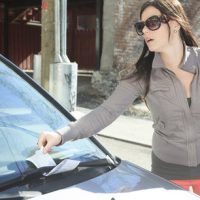Top Five Non-Moving Violations in Loudoun County

Most people cannot drive more than four or five blocks without violating at least one provision in Virginia’s extremely complex traffic code. That’s just the moving violations. Many vehicles are not street legal, making their drivers subject to a stop at any time. The next step in a traffic stop is usually a criminal investigation. Officers look for signs of alcohol or drug use. They also run warrant checks.
In a way, all non-moving violation stops are profiling stops. Walk around a shopping mall parking lot and look at the vehicle parked there. Usually, a significant number of these vehicles aren’t street legal. A Leesburg criminal defense lawyer applies this general principle to specific situations. Once they understand the facts, many jurors believe that a non-moving violation is simply an excuse to detain the defendant.
Parking Violations
Common parking violations include parking in a no-parking zone, overstaying a paid spot, and parking the wrong direction (cars parked on the street must face the same way as the traffic on that street).
Police officers aggressively enforce the first two infractions in downtowns or other areas where parking is scarce. Furthermore, when people move their cars or feed parking meters, the area appears more energetic.
The third area is associated with broken windows, a controversial police tactic. According to this theory, cracking down on minor infractions, like parking violations, and code infractions, like broken windows, discourages lawless behavior. Some evidence supports this theory, which is commonly associated with racial profiling.
Window Tint
Virginia law allows a maximum 50 percent tint on front side windows and 65 percent tint on back side and rear windows. No one can tell the difference between 65 percent and 64 percent on site alone, especially if the vehicle is moving.
Frequently, officers don’t care about the illegal tint. They care about what might be happening behind those tinted windows. Any window tint, heavy or light, is probably sufficient for reasonable suspicion, the low standard of proof required for a traffic stop.
Once officers pull suspects over for illegal tint, whether or not it’s illegal, they launch one of the aforementioned alcohol or drug use investigations. They also look for contraband property, like illegal weapons.
Dangling Object
Virginia law states that drivers must have a clear, unobstructed view. This law is aimed at drivers who don’t clean their windshields when it snows. This law could also be used to pull over motorists who hang dangling objects, like an air freshener or crucifix, from a rear-view mirror.
More than likely, before an officer makes such a stop, s/he saw dozens of other vehicles that violated this law. You probably have a personal icon or parking pass hanging on your rear-view mirror. So, officers are hard-pressed to explain why they let all those other people go and pulled over the defendant.
Expired Dealer Tag
Paper dealer tag fraud has become so widespread that several states have banned these plates. Anyone with a laser printer and a little artistic skill can make such a tag, especially an out-of-state tag, that will fool the po-po.
If you drive a car with a dealer tag, our Leesburg criminal defense lawyers urge you to get permanent plates as quickly as possible. Driving with a paper tag is like driving with a sign that states “Please pull me over.”
License Plate Frame
This law is another view of obstruction law. If a slightly oversized frame covers the tip-top of VIRGINA, the vehicle violates this law and police could pull over the driver. The same profiling principles examined above apply in these situations.
Count on a Diligent Loudoun County Lawyer
There’s a big difference between an arrest and a conviction in criminal law. For a free consultation with an experienced criminal defense attorney in Leesburg, contact Simms Showers, LLP, Attorneys at Law. The sooner you reach out to us, the sooner we start working for you.
Source:
law.lis.virginia.gov/vacode/title46.2/
